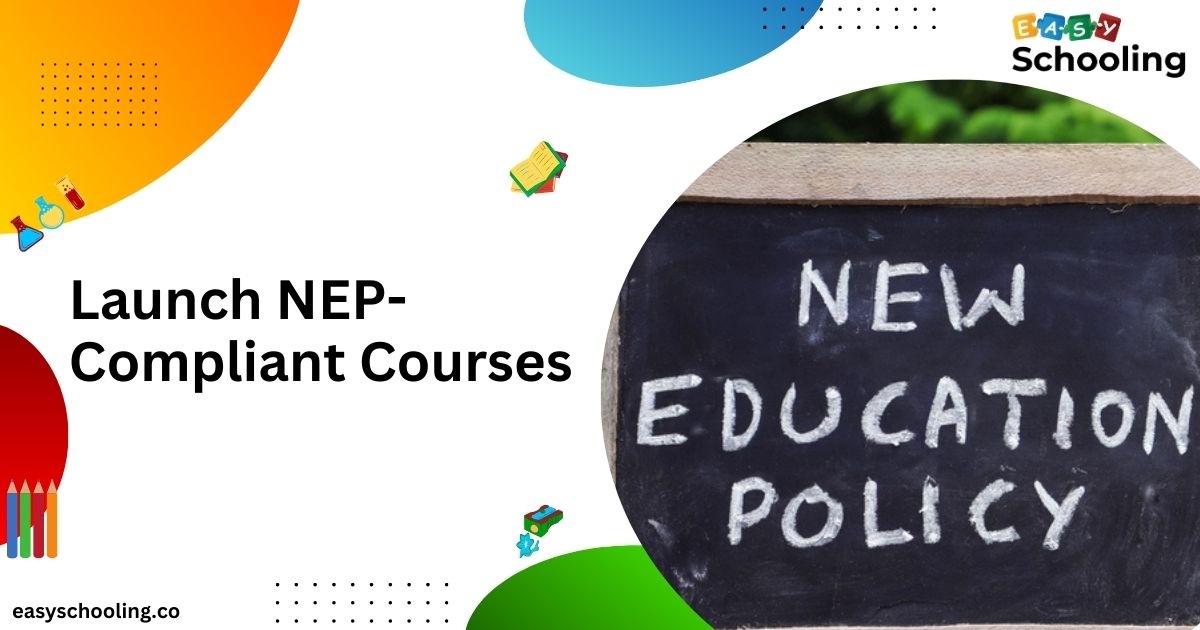The National Education Policy (NEP) has sparked a transformative shift in India’s education landscape, emphasizing holistic learning and skill development. As institutions adapt to the NEP’s guidelines, the launch of NEP-compliant courses emerges as a pivotal step toward creating an inclusive and future-ready educational ecosystem.
Embracing NEP Guidelines
Understanding NEP:
NEP 2020 envisions a comprehensive overhaul of the education system, aiming to foster creativity, critical thinking, and holistic development among students. It emphasizes the importance of multidisciplinary education, experiential learning, and flexible curriculum frameworks.
Adapting Curriculum:
Launching National Education Policy(NEP)-compliant courses involves aligning curriculum structures, teaching methodologies, and assessment practices with the principles outlined in the policy. This includes integrating vocational education, promoting regional languages, and incorporating technology-enabled learning solutions.
Key Components of National Education Policy(NEP)-Compliant Courses
Multidisciplinary Approach:
NEP encourages schools and colleges to offer multidisciplinary courses that bridge traditional subject boundaries and promote interdisciplinary thinking. By integrating diverse disciplines such as arts, sciences, and humanities, these courses nurture well-rounded individuals capable of addressing complex real-world challenges.
Experiential Learning:
National Education Policy(NEP) emphasizes the significance of experiential learning, where students engage in hands-on activities, projects, and fieldwork to gain practical insights and skills. NEP-compliant courses incorporate experiential learning methods to enhance student engagement, critical thinking, and problem-solving abilities.
Flexible Assessment Methods:
Gone are the days of rote memorization and high-stakes exams. National Education Policy(NEP) advocates for competency-based assessments that evaluate students’ understanding, application, and creativity. NEP-compliant courses utilize innovative assessment methods such as portfolios, presentations, and project-based assessments to gauge student learning effectively.
Implementation Strategies for National Education Policy(NEP)-Compliant Courses
Curriculum Revision:
Institutions need to revise their existing curriculum to align with NEP guidelines. This involves updating course content, integrating cross-disciplinary themes, and incorporating skill-based learning modules.
Teacher Training:
To effectively implement National Education Policy(NEP)–compliant courses, educators require specialized training in pedagogical approaches, assessment methods, and technology integration. Professional development programs can equip teachers with the skills and knowledge needed to facilitate engaging and interactive learning experiences.
Infrastructure Enhancement:
Infrastructure plays a crucial role in supporting NEP-compliant courses, including access to digital resources, laboratories, libraries, and other learning facilities. Institutions must invest in upgrading their infrastructure to create conducive learning environments that cater to diverse educational needs.
Benefits of Launching NEP-Compliant Courses
Enhanced Learning Outcomes:
National Education Policy(NEP)-compliant courses prioritize deep learning, critical thinking, and skill development, resulting in improved learning outcomes and academic performance. Students become active participants in their education, equipped with the skills and knowledge needed to excel in diverse fields.
Preparation for the Future:
In a rapidly evolving global landscape, NEP-compliant courses prepare students for the challenges and opportunities of the future. By fostering creativity, innovation, and adaptability, these courses empower students to navigate dynamic career pathways and contribute meaningfully to society.
Inclusive Education:
National Education Policy(NEP) promotes inclusive education by accommodating diverse learning needs, interests, and abilities. NEP-compliant courses embrace a learner-centric approach, ensuring that every student receives personalized support and opportunities for growth.
Conclusion: Embracing the Future of Education
The launch of NEP-compliant courses marks a significant milestone in India’s education landscape, signaling a paradigm shift from rote learning to holistic education. By embracing National Education Policy(NEP) principles and launching innovative courses, institutions can empower students with the knowledge, skills, and values needed to thrive in the 21st century.
As we embark on this transformative journey, collaboration among stakeholders, commitment to excellence, and a student-centric approach will be key drivers of success. Together, let us harness the power of education to create a brighter and more inclusive future for generations to come. Learn more from EasySchooling.co.
FAQs: Unlocking Clarity on National Education Policy(NEP)-Compliant Courses
- What is the National Education Policy (NEP)?
- NEP is a comprehensive framework that outlines India’s vision for education reform, emphasizing holistic development, equity, and quality.
- Why are NEP-compliant courses important?
- NEP-compliant courses align with the principles and objectives of the National Education Policy, promoting innovation, inclusivity, and excellence in education.
- How can institutions launch NEP-compliant courses?
- Institutions can launch NEP-compliant courses by revising their curriculum, adopting innovative teaching practices, and integrating NEP guidelines into their educational frameworks.
- What are the key features of NEP-compliant courses?
- NEP-compliant courses prioritize multidisciplinary education, experiential learning, flexible assessment methods, and inclusive practices to enhance student engagement and outcomes.
- How do NEP-compliant courses benefit students?
- NEP-compliant courses empower students with critical thinking skills, creativity, and real-world competencies, preparing them for diverse career pathways and lifelong success.
- What role does technology play in NEP-compliant courses?
- Technology serves as an enabler in NEP-compliant courses, facilitating personalized learning, access to resources, and collaborative opportunities for students and educators.
- How do NEP-compliant courses promote equity and inclusion?
- NEP-compliant courses prioritize equity and inclusion by catering to diverse learning needs, providing equal opportunities for all students to thrive academically and personally.
- Are NEP-compliant courses suitable for all educational levels?
- Yes, NEP-compliant courses are designed to cater to learners across various educational levels, from pre-primary to higher education, ensuring continuity and coherence in educational experiences.
- What support is available for educators to implement NEP-compliant courses?
- Educators can access training programs, resources, and professional development opportunities to equip themselves with the skills and knowledge needed to effectively implement NEP-compliant courses.
- How can stakeholders collaborate to promote NEP-compliant courses?
- Collaboration among policymakers, educators, parents, and communities is essential to promoting NEP-compliant courses and creating a conducive environment for quality education and lifelong learning.
